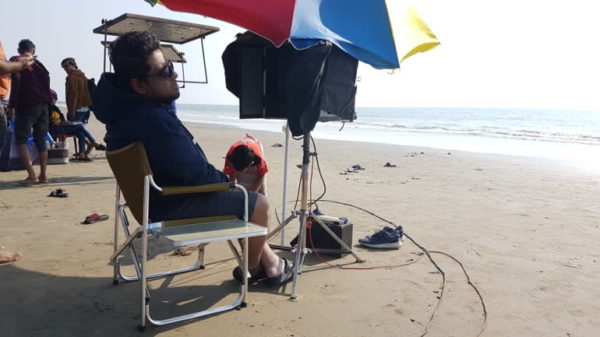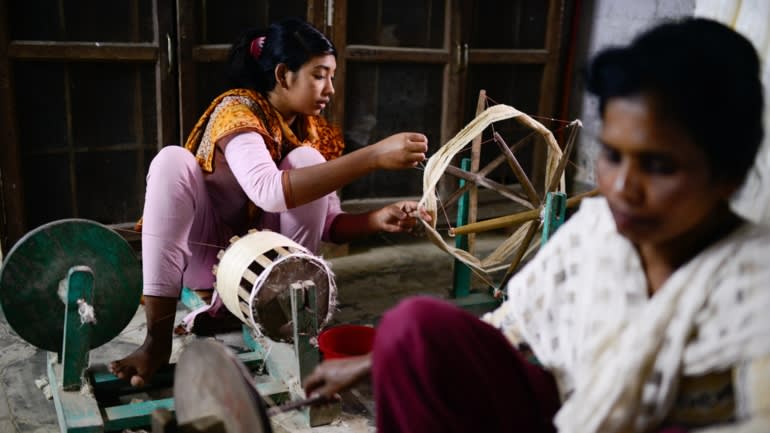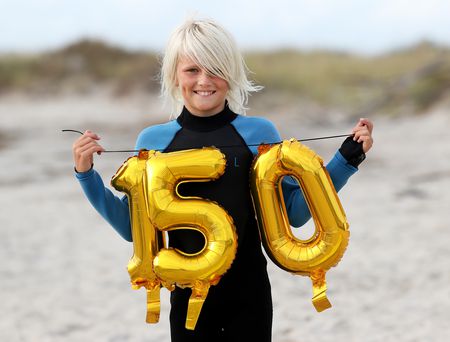DHAKA — The new film “No Dorai” is based on the inspirational story of Bangladesh’s first female surfer, who beat most of the male surfers she competed against. But the fictional name given to its lead character has stirred up a religious storm that may result in the movie being banned in its homeland.
Director Tanim Rahman, 35, was busy promoting “No Dorai” — titled “Dare to Surf” for international markets — when he was served with a legal notice on Dec. 10 that led to the withdrawal of the film from cinemas in the cities of Dhaka and Chattagram, where it had been showing since Nov. 29.
The problem? The film’s main character is named Ayesha, the name — sometimes written as Aisha — of one of the wives of Muhammad, the chief prophet and central figure of Islam. Huzzatul Islam, who filed a writ seeking the film’s ban as a lawyer at the Bangladesh Supreme Court, claims it portrays the prophet’s wife in a derogatory manner.
“No Dorai,” which means “not afraid” in Bengali, is based on the life story of Nasima Akter, now 21 and is the first production from local theater operator Star Cineplex. In the film, the character Ayesha takes up surfing in defiance of the conservative Bangladeshi community in which she lives.
“It took us four years to materialize the film from its chalkboard stage and it was doing well after its release,” said Rahman, known mostly for his documentary productions for nongovernmental organizations as well as music videos. “Then all of a sudden we got the legal notice and a subsequent court order to withdraw the film from the market. The reason they cited for the withdrawal was absurd.”
According to the writ filed by Huzzatul Islam, Ayesha appears in the film wearing indecent clothes. She also swims — an activity considered taboo for women in most of Bangladesh.
“This hurts the religious sentiment of our predominantly Muslim country,” Islam told the Nikkei Asian Review.
The filmmakers are due in court on Jan. 9 to argue that the film should not be banned.
Bangladesh has made considerable progress in empowering women over the last decade. In the World Economic Forum’s recent “Global Gender Gap Report 2020,” the nation ranked tops its South Asia. The country was ranked 50th of 153 countries globally.
Female economic participation has increased significantly in recent years, in part because women account for more than 60% of the workforce of the country’s clothing factories, its largest export earner.
Bangladesh has been led by female prime ministers since 1991 and the current parliamentary speaker and opposition leader are also female. The country has enacted a number of policies to give women greater control over their lives and help them to play a more influential role in society. By law, at least 50 of the 350 members of parliament must be female.
Despite these developments, girls in rural areas, which are home to two-thirds of the country’s 170 million people, are rarely allowed to go to school or choose their line of work. Their families still need to pay dowries when they marry.
Islam said he had nothing against female empowerment. “But I have a problem against using this name,” Ayesha, he said. “The name has to be changed or the film has to be withdrawn.”
Rahman rejects the notion that the film’s lead character dresses inappropriately.
“They said Ayesha wore a bikini. It’s a bizarre claim,” he said. “Why should I portray a poor Bangladeshi girl wearing a bikini in the film when I tried to make the portrayal of the story as original as possible?”
“I even use the local dialect of Chattagram in the film instead of traditional Bangla language so that the film remains true to its story,” he added.
Islam admits he did not actually watch the film before seeking its ban.
“I don’t need to see it,” he said. “I have seen its posters and billboards.”
Islam said he had read in a certain local newspaper that Ayesha wears a bikini in the film, but no such article could be found by Nikkei.
Tanjib ul Alam, a lawyer representing the filmmakers, told Nikkei that he will argue in court that Islam’s petition is unreasonable since Ayesha does not in fact wear a bikini, her character is not portrayed in a derogatory manner and her name is a common one in the country.
Mahboob Rahman, the film’s producer, said he decided not to use Akter’s real name because a documentary film has already been made about her by a foreign director. So he named the protagonist after his mother.
“I wanted to portray a strong female character through this name,” he said, calling Akter an “extraordinary” personality.
Said Rahman, who is unrelated to Tanim, “I met her (Akter) in 2015 when I went to learn surfing in Cox’s Bazar,” often referred to as the world’s longest beach.
“She was the best surfer and frequently bested her male peers in surfing,” he said. “I got curious and learned about the amazing journey she had in her life.”
Akter became homeless at the age of seven. After facing many difficulties, she found hope in the surfing community in Cox’s Bazar.
“Nasima’s story ultimately ended on a sad note,” Rahman said. “She got married at the age of 19 and became a mother of two. She rarely surfs now. In my movie, I wanted the protagonist to fight back and continue surfing.”
Sunerah Binte Kamal, who plays the character of Ayesha in the movie, said she was shocked to hear about the potential ban. “I did my surfing in the movie wearing salwar kameez,” she said, referring to the traditional suit of loose trousers and a long shirt worn by many South Asian women. “It is absurd to claim that I wore a bikini.”
“This movie is very important as in our country, women are still repressed and are not allowed to do what they like to do,” Kamal said. “By showing Ayesha returning to surfing despite being forced into an early marriage, this movie sends a message that women are advancing.”
Mushfiqur Rahman Gulzar, president of the Bangladesh Film Directors Association, called the movie a “trendsetter” for the Bangladesh film industry. It produces an average of 170 films a year, generating revenues of about $65 million.
“For our association, we would like to lay out support for the movie,” he said. “Artists and directors must be given freedom to express their ideas.”


 Lead actor Sarifur Raaz in a still from “No Dorai.” (Courtesy of Tanim Rahman)
Lead actor Sarifur Raaz in a still from “No Dorai.” (Courtesy of Tanim Rahman) Women spin cotton in a village outside Dhaka. © Getty Images
Women spin cotton in a village outside Dhaka. © Getty Images Nasima Akter and on-screen counterpart Ayesha were both forced into marriage after making a splash at surfing, but Ayesha, above, resumed the sport while Akter has not. (Courtesy of Tanim Rahman)
Nasima Akter and on-screen counterpart Ayesha were both forced into marriage after making a splash at surfing, but Ayesha, above, resumed the sport while Akter has not. (Courtesy of Tanim Rahman) “No Dorai” was shot on location at Cox’s Bazar, often called the world’s longest beach. (Courtesy of Tanim Rahman)
“No Dorai” was shot on location at Cox’s Bazar, often called the world’s longest beach. (Courtesy of Tanim Rahman) The cast and crew of “No Dorai.” (Courtesy of Tanim Rahman)
The cast and crew of “No Dorai.” (Courtesy of Tanim Rahman)



Recent Comments